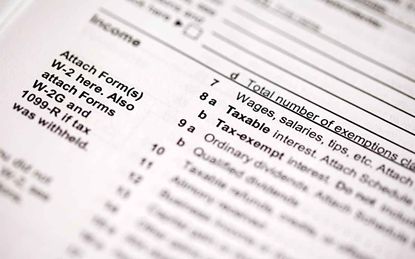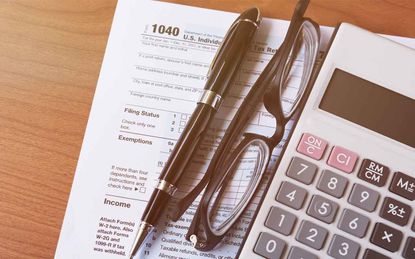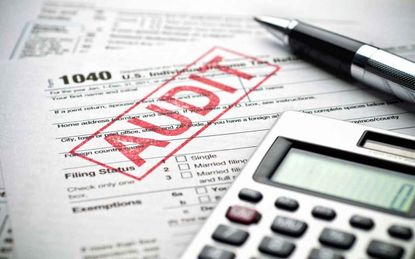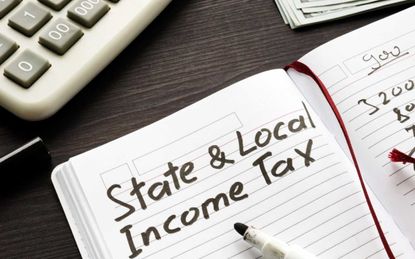Taxes on Gambling Winnings and Losses: 8 Tips to Remember
If you pick the right horse at the track or win some money at a casino or through online betting, don't forget gambling taxes.


Gambling taxes are common because the American gaming industry is booming. From new casinos to lotteries and online sports betting, there are plenty of opportunities if you enjoy gambling. And data from the Pew Research Center show that you wouldn't be alone. (Nearly 20% of adults say they placed a sports bet during the year).
However, if you're lucky enough to win from a bet or smart gamble, don't forget that the federal government wants its cut through gambling taxes. So, here are 8 things to know about how gambling winnings are taxed.

Gambling taxes: You have to report all your winnings
Whether it's $5 or $5,000, from the track, an office pool, a casino or a gambling website, all gambling winnings must be reported on your tax return as "other income" on Schedule 1 (Form 1040). If you win a non-cash prize, such as a car or a trip, report its fair market value as income.
And be sure you report all your gambling winnings. The IRS isn't typically hunting down small-time winners, but you should file an accurate income tax return.

Taxes on gambling winnings: You might get a Form W-2G
Generally, you'll receive an IRS Form W-2G if your gambling winnings are at least $600 and the payout is at least 300 times the amount of your wager.
- For bingo and slot machine winnings, the threshold is $1,200
- For keno winnings, the threshold is $1,500
- For poker tournament winnings, the threshold is $5,000.
The payout doesn't have to be 300 times the wager for these types of winnings). Your reportable winnings will be listed in Box 1 of the W-2G form.
If a W-2G is required, the payer (sports betting parlor, casino, racetrack, lottery, etc.) will need to see two forms of identification.
- One form must be a photo ID
- You also need to provide your Social Security number
- If you don't have a SSN, then you'll need a taxpayer identification numbe (TIN)
In some cases, you'll get the W-2G on the spot. Otherwise, for 2023 winnings, the payer must send the form to you by Jan. 31, 2024. In any event, if your bet was with a casino, we're fairly certain you'll get the W-2G. But if your bet was just a friendly wager with a friend or you won an office pool … well, don't count on it.

Gambling taxes: Withholding might be required
Generally, if you win more than $5,000 on a wager, and the payout is at least 300 times the amount of your bet, the IRS requires the payer to withhold 24% of your winnings for income taxes. (Special withholding rules apply for winnings from bingo, keno, slot machines and poker tournaments.) The amount withheld will be listed in Box 4 of the W-2G form you'll receive. You will also have to sign the W-2G stating under penalty of perjury, that the information listed on the form is correct.
When you file your 1040 for the tax year, include the amount withheld by the payer, as federal income tax withheld. It will be subtracted from the tax you owe. You'll also have to attach the W-2G form to your return.
Again, this is what to expect when you place a bet at a casino, racetrack, sports betting parlor, or with some other legally operated gaming business. Don't expect your friend who is running an office pool, for example, to withhold taxes (although, technically, they should).

Your gambling losses might be deductible
Did you have a bad night at the blackjack table or pick the wrong horse to win? There's a possible silver lining if you lose a bet or two — your gambling losses might be deductible. (Gambling losses include the actual cost of wagers plus related expenses, such as travel to and from a casino or other gambling establishment.)
There are a couple of important catches, though. First, unless you're a professional gambler (more on that later), you have to itemize in order to deduct gambling losses (itemized deductions are claimed on Schedule A). Unfortunately, most people don't itemize. So, if you claim the standard deduction, you're out of luck twice — once for losing your bet and once for not being able to deduct your gambling losses.
Second, you can't deduct gambling losses that are more than the winnings you report on your return. For example, if you won $100 on one bet but lost $300 on a few others, you can only deduct the first $100 of losses. If you were totally down on your luck and had absolutely no gambling winnings for the year, you can't deduct any of your losses.
Also, according to the IRS, "to deduct your [gambling] losses, you must be able to provide receipts, tickets, statements or other records that show the amount of both your winnings and losses."
If you are a professional gambler, you can deduct your losses as business expenses on Schedule C without having to itemize. However, a note of caution: An activity only qualifies as a business if your primary purpose is to make a profit and you're continually and regularly involved in it. Sporadic activities or hobbies don't qualify as a business.

Report gambling winnings and losses separately on your tax return
Gambling winnings and losses must be reported separately.
Say, for example, you made four separate $100 bets on four different horses to win a race. If you won $500 for the one bet you got right, you must report the full $500 as taxable income. You can't reduce your gambling winnings ($500) by your gambling losses ($400) and only report the difference ($100) as income. If you itemize, you can claim a $400 deduction for your losses, but your winnings and losses must be handled separately on your tax return.

Keep good records of your gambling winnings and losses
To help you keep track of how much you've won or lost over the course of a year, the IRS suggests keeping a diary or similar record of your gambling activities.
At a minimum, your records should include the dates and types of specific wagers or gambling activities, name and address/location of each casino, racetrack, or other gambling establishment you visited, names of other people with you at each gambling site, and the amounts that you won or lost.
You should also keep other items as proof of gambling winnings and losses. For example, hold on to all W-2G forms, wagering tickets, canceled checks, credit records, bank withdrawals, and statements of actual winnings or payment slips provided by casinos, sports betting parlors, racetracks, or other gambling establishments.

Audit risks may be higher with gambling taxes
If you receive a W-2G form along with your gambling winnings, don't forget that the IRS is getting a copy of the form, too. So, the IRS is expecting you to claim those winnings on your tax return.
Deducting large gambling losses can also raise red flags at the IRS. Remember, casual gamblers can only claim losses as itemized deductions on Schedule A up to the amount of their winnings.
Be careful if you're deducting losses on Schedule C, too. The IRS is always looking for supposed "business" activities that are just hobbies.

Gambling winnings: State and local taxes may apply
If you look carefully at Form W-2G you'll notice that there are boxes for reporting state and local winnings and withholding. That's because you may owe state or local taxes on your gambling winnings, too.
The state where you live generally taxes all your income — including gambling winnings. However, if you travel to another state to place a bet, you might be surprised to learn that the other state wants to tax your winnings, too. And they could withhold the tax from your payout to make sure they get what they're owed. You won't be taxed twice, though. The state where you live should give you a tax credit for the taxes you pay to the other state.
You may or may not be able to deduct gambling losses on your state tax return. Check with your state tax department for the rules where you live.
Related Content
Rocky Mengle was a Senior Tax Editor for Kiplinger from October 2018 to January 2023 with more than 20 years of experience covering federal and state tax developments. Before coming to Kiplinger, Rocky worked for Wolters Kluwer Tax & Accounting, and Kleinrock Publishing, where he provided breaking news and guidance for CPAs, tax attorneys, and other tax professionals. He has also been quoted as an expert by USA Today, Forbes, U.S. News & World Report, Reuters, Accounting Today, and other media outlets. Rocky holds a law degree from the University of Connecticut and a B.A. in History from Salisbury University.
-
 Stock Market Today: Nasdaq Spirals as Netflix Nosedives
Stock Market Today: Nasdaq Spirals as Netflix NosedivesA big earnings boom for credit card giant American Express helped the Dow notch another win.
By Karee Venema Published
-
 Get These 40 Earth Day Deals and Discounts
Get These 40 Earth Day Deals and DiscountsMonday, April 22, is Earth Day. Many of your favorite retailers are celebrating with deals on sustainable products, recycling services, and more
By Kathryn Pomroy Published
-
 'Instant' EV Tax Credits Are a Hit: $580M Paid This Year
'Instant' EV Tax Credits Are a Hit: $580M Paid This YearEV Credits Claiming federal electric vehicle tax credits at the point of sale is a new and popular option in 2024.
By Kelley R. Taylor Last updated
-
 Retirees Face Significant Tax Bills Due to Fraud
Retirees Face Significant Tax Bills Due to FraudFraud A new report sheds light on how older adult scam victims end up with big tax bills and lost retirement savings.
By Kelley R. Taylor Last updated
-
 Tax Day: Is the Post Office Open Late?
Tax Day: Is the Post Office Open Late?Tax Filing Tax Day means some people need to mail their federal income tax returns.
By Kelley R. Taylor Published
-
 High Earners: Beware of These Illegal Schemes to Lower Taxes
High Earners: Beware of These Illegal Schemes to Lower TaxesTax Schemes The IRS says high-income filers are targets for several illegal tax schemes.
By Katelyn Washington Last updated
-
 Mailing Your Tax Return This Year? What to Know Before You Do
Mailing Your Tax Return This Year? What to Know Before You DoTax Filing There are plenty of reasons not to mail your tax return this year, but here’s what you should know if you are.
By Katelyn Washington Last updated
-
 IRS Warning: Beware of Smishing and 'Helper' Tax Scams
IRS Warning: Beware of Smishing and 'Helper' Tax ScamsScams Tax season is a time to look out for email and text message scams.
By Kelley R. Taylor Last updated
-
 Most Expensive States to Live in for Homeowners
Most Expensive States to Live in for HomeownersProperty Taxes High property tax bills make the places on this list the most expensive states for homeowners to live in.
By Katelyn Washington Last updated
-
 Don’t Miss This $2,500 Tax Break for Paying Your Student Loan
Don’t Miss This $2,500 Tax Break for Paying Your Student LoanTax Deductions Do you qualify for the student loan interest deduction this year?
By Katelyn Washington Last updated
